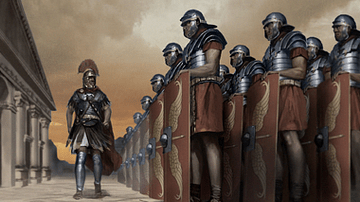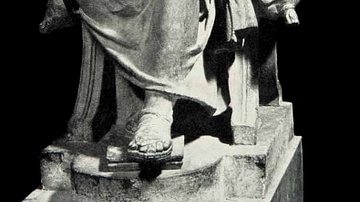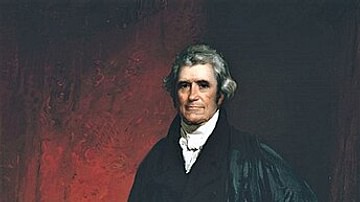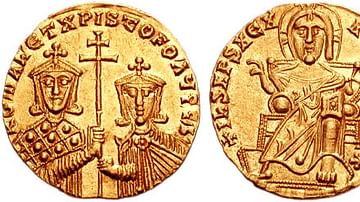Search
Did you mean: Persis?
Search Results

Definition
Midgard
Midgard is the realm of human beings in Norse mythology. The Old Norse word garðr literally means an enclosure (yard), and miðr (middle) refers to its position as a circle with both an interior ocean, and an outer ocean beyond which there...

Definition
Gades
Gades (modern-day Cadiz, Spain) was an ancient city located on the island of Erytheia, northwest of Gibraltar at the tip of the Iberian Peninsula and is believed to be one of the most ancient cities still standing in Western Europe. Although...

Definition
Legio V Alaudae
Legio V Alaudae, referenced in early accounts only as the "Fifth", was one of the many legions of the Roman army that helped Julius Caesar (100-44 BCE) to achieve success as a military commander in Gaul, Spain, and Africa. Later stationed...

Definition
Malcolm III of Scotland
Malcolm III of Scotland (aka Máel Coluim mac Donnchada) reigned as king from 1058 to 1093 CE. He took the throne after his young predecessor Lulach (r. 1057-1058 CE), the stepson of Macbeth, king of Scotland (r. 1040-1057 CE), was killed...

Definition
Oedipus at Colonus
Oedipus at Colonus was the third play of the Oedipus trilogy written by the great Greek tragedian Sophocles (c. 496 - c. 406 BCE). Although written in the years prior to his death, it would finally be presented by his son Iophon at a dramatic...

Definition
Marcus Claudius Marcellus
Marcus Claudius Marcellus (c. 270-208 BCE) was a five-time consul and, earning the nickname the 'Sword of Rome', he was one of the city's greatest military commanders. Active in both the First and Second Punic Wars, he also won honours for...

Definition
Marbury v. Madison
Marbury v. Madison (1803) was a landmark decision of the United States Supreme Court that established the principle of judicial review. In the decision, written by Chief Justice John Marshall, the court struck down a congressional statute...

Definition
Romanos I
Romanos I Lekapenos (“the Ignorant”) was emperor of the Byzantine Empire from 920 to 944 CE. Of Armenian descent, he was a military commander who usurped the throne to rule as co-emperor with the rightful heir, but still minor, Constantine...

Definition
Jacques Offenbach
Jacques Offenbach (1819-1880) was a composer of German birth who took French citizenship and became famous in Paris for his comic operettas, a genre he created, and for the more serious opera, The Tales of Hoffmann. A virtuoso cellist, conductor...

Definition
Electra by Sophocles
Electra is a play written by the 5th-century BCE Greek tragedian Sophocles. Similar to Aeschylus' Libation Bearers, Electra focuses on the return of Electra's brother Orestes from exile and the plot to murder their mother. Years earlier...